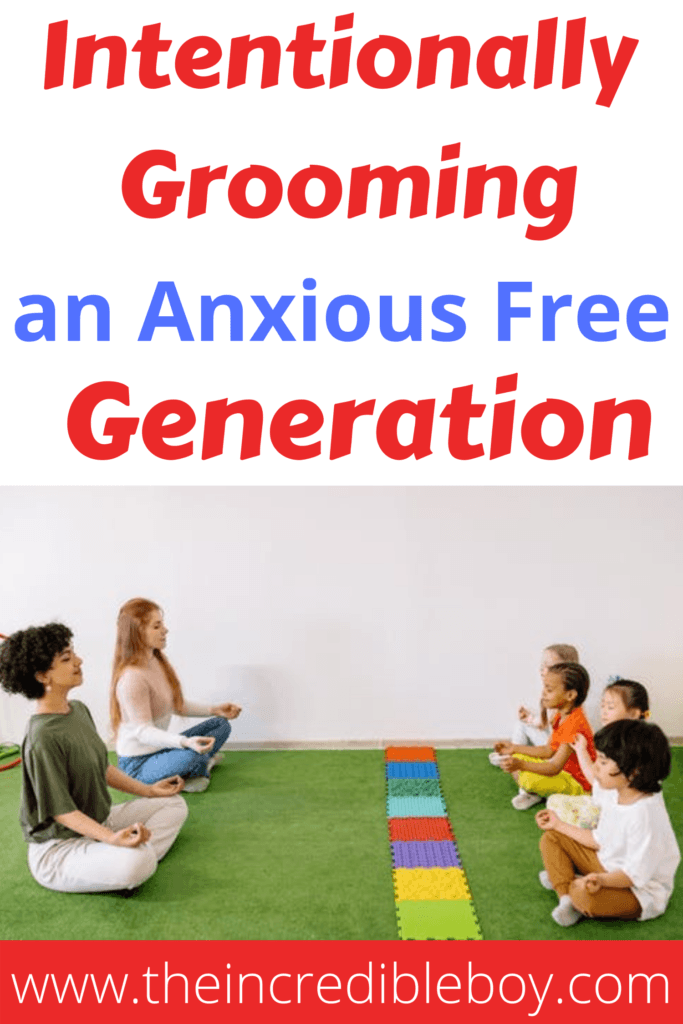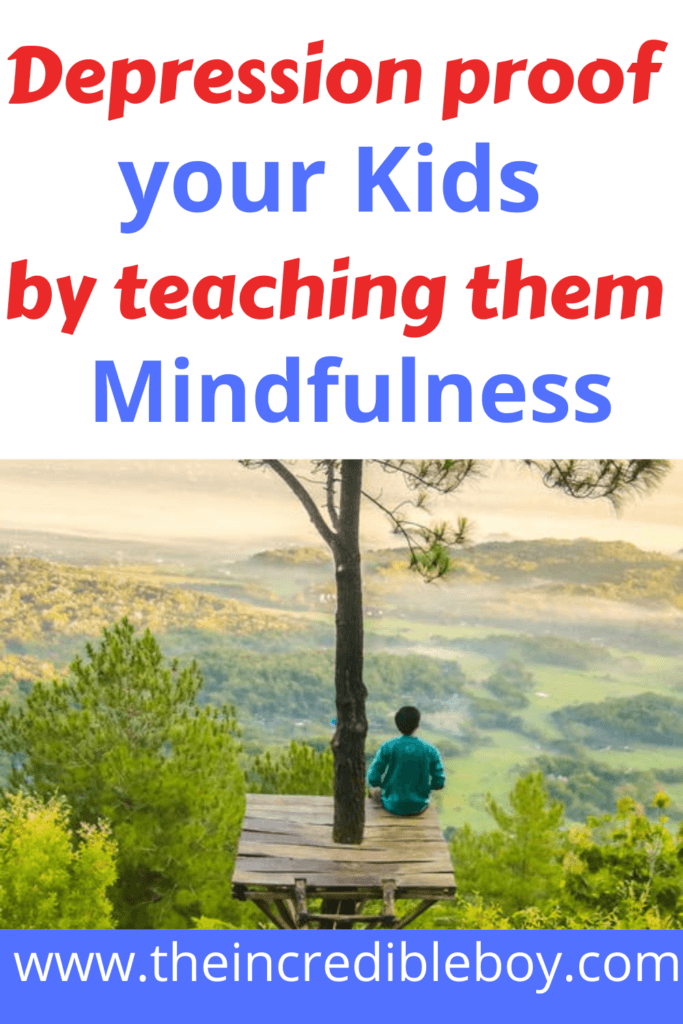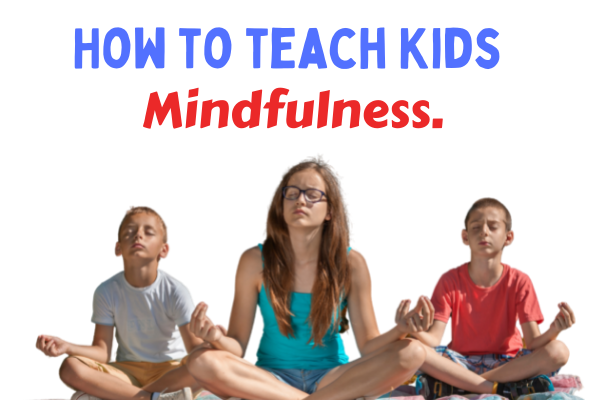In the world where it is easy to get stuck in your head, where you can literally create a world parallel to reality just between your ears, because of involuntary undisciplined thoughts that are 90% negative, it is now more than ever crucial to know How to teach kids mindfulness, it is important to have more conversations about mindfulness. These conversations should be held at home, in classrooms, in churches on social media, and everywhere else.
The truth is the conversations are gaining momentum but only in adult’s streets. The purpose of this article is to challenge you the reader to take this conversation to your kids. Mindfulness is what we need to groom a less anxious and happy generation.
What is mindfulness?
Oxford dictionary defines mindfulness as a mental state achieved by focusing one’s awareness on the present moment, while calmly acknowledging and accepting one’s feelings, thoughts, and bodily sensations, used as a therapeutic technique.
We mostly experience stress, anxiety, and depression because of our inability to focus our awareness on the present moment. The present moment is in most times a shred of evidence that things are not as bad we think they are in our heads. While spending our time in a blurry future or in the messed up past can wreak havoc in our heads focusing on this very present moment can be a comfort and strength that we need. Every human being has an inborn ability to be mindful we all just need to learn how to access it.
Why should we teach kids about mindfulness?
There are countless reasons, why we should be intentional about teaching kids mindfulness. Mindfulness will positively impact their now and their future as professionals, parents, spouses, citezens and more.
1. Reduce stress
We have all heard that stress is the number one silent killer because it is linked to six leading causes of death i.e. cancer, accidental injuries, respiratory disorders, coronary heart disease, cirrhosis of the liver, and suicide. There are plenty of ways in which mindfulness reduces stress, amongst many, it is known to lower activity in the part of your brain called the amygdala, which is central to switching on the stress response
2. Enhance the general well being
Mindfulness has proved itself to reduce anxiety, improve our moods, and save us from depression but the big question is what is its value on our physical wellbeing. The answer to this question is a resounding yes. While mindfulness might not be taken as a standalone treatment for our physical ailments research continues to show its positive impact in improving the immune system. Without going into a medical explanation of how mindfulness improves our general wellbeing, the fact that this practice is known to knock down stress and stress is linked to six main causes of strength one can safely assume that our general well-being is bound to improve if we consistently practice mindfulness. For a deeper understanding of how mindfulness enhances our well being check this article

3. Build confidence
Mindfulness is the space that we create between ourselves and our thoughts that are on autopilot.
In most cases, these involuntary thoughts are negative revolving around our failures, shortcomings, and how unworthy we are. If a child consistently holds such thoughts about himself, his confidence will certainly be knocked down. To improve confidence we need something to radically disrupt the thought patterns and that is where mindfulness comes in. When we achieve this mental state we start to feel more grounded, we feel that we are in control. This improves our decision-making, our social interactions, our communication, and confidence in general. Let’s teach our kids not to judge themselves based on their past failures or on the fears they have about future performance but to invest in their being the task at hand. Raising confident kids should not be a wish but a daily intention, for more insight on this topic go here.
4. Equip them for challenging situations.
Mindfulness is a must have tool to have if you are navigating some challenging seasons in your life.
We teach our kids a lot of things of which most are academic and career-related. On very few occasions do we teach them how to thrive and come out alive on the other side during times of crisis. And I believe that such are invaluable lessons that should never be overlooked. Mindfulness enables us to be in touch with our crisis/pain, not to run away from it but to be present in it, until it losses its power to negatively impact us. While present in our pain if we can bring your attention to the now, you are able to realize that the sky is still blue, the birds are singing and the trees are green, you realize that the universe is still intact and that brings a beam of hope. When you realize that your crisis is just but a tiny particle, you gain courage to march out one step at a time, one breath at a time.
5. Increases focus and academic performance.
The reduction in anxiety and the increase in confidence will directly positively impact academic performance. But beyond these two positives, mindfulness especially through meditation has been observed to even alter our physical brain when done consistently. Amongst the changes that are noted is that the pre-frontal cortex. Which is the brain center responsible for executive functions including planning increased awareness, concentration, memory, and decision making thickens with repetitive medication practice.
How to teach kids mindfulness
- Model Mindfulness
I have written about modeling as the best form of teaching in most of my articles. This technique still applies if we are to teach our kid’s mindfulness. You need to make it your way of life, for them to pick it up. Let the kids see you meditate frequently. When you take a walk with them describe what you see and hear around you. The beautiful blue sky, the tall green trees the bids singing, and more. Let them learn that you are not just putting your foot in front of the other but you are fully aware of your surroundings. Let them see and hear you savor in the happenings of the present moment.
2. Teach them to tune in to their senses.
You can start by teaching them to take a few minutes body scan meditation. They can sit in their most comfortable position, lying down or sitting. This can be followed by deep breaths, with each deep breath encourage them to place their attention on a certain part of their body. Let them feel each part as they shift their focus through their body. This will enable them to connect and be in touch with their body. You can start from the head until the toes. There are plenty of body scan meditations online go through them until you get something that works for them.
3. Fully engage with food
The number one rule should be no multitasking during meals. You cannot eat while watching YouTube or playing a game not even a noble act of reading. Let them be in touch with the food texture, the smell, color, and of course the taste. Studies suggest that we are more likely to get full from what we eat when we practice mindful eating than when we are eating and multitasking.
4. Three Breath Hug Exercise
This one works magic when they feel overpowered by strong emotions. But it shouldn’t only be left for tense moments but can be used as a greeting, goodbye, or just a love hug during the day. The good thing is, you don’t even need to schedule it anytime can be a magical time. All you need to do is give your child a big loving hug, then together take three synchronized, deep breaths, relaxing in each other’s arms, allowing all the tension to melt away.
5. Make meditation a family affair
Kids take pleasure in imitating us, thus it can be easy to get them to be part of this transformative ritual. And this takes us back to the first point we made, the best way to teach mindfulness is to model it. Schedule a time and place in the house and prepare all you need before the set time. If you are doing guided meditation prepare the needed audio, get the cushions or mats ready and make the environment serene. Let everyone know where they will be sitting. If you are working with kids such details are very vital. I remember the days that we tried meditation without proper preparation. If preparation was not done 10 minutes meditation ends up taking a full hour or more, not talking about the arguments and the bickering of who is going to sit next to mommy and the likes.

Final Thoughts
Imagine an anxious free and depression proofed generation. With that kind of imagination be determined to be a contributor to building such a generation by being intentional about equipping your kids with tools that will enable them to calmly navigate whatever life throws at them. Not only that imagine being a contributor to truly happy kids, who will grow up to be truly happy adults. How about witnessing your child growing from being unable to win against his strong emotions to being a total master at that game. What I like about mindfulness is that it can be done for free within a very limited time. Lets be intentional about raising a mindful generation.
Here is raising Boys to be Incredible Men.

I absolutely agree with the first sentence of the article. I think it illustrates marvelously the necessity of our children learning the skill of mindfulness. And, yes, it’s not like they themselves will come to that realization. We need to help them.
I loved the “why” section. Personally, I’m always huge on the “why,” namely, I typically have trouble sticking to new habits if I am not 90-100% aware as to why I am doing it. Whereas if I do have all the reasons easily at my disposal, then it’s so much easier to stick to things. For me, an interesting is that my kids (and I think kids just in general) also do things or follow certain behaviors far more frequently if they’re well aware of the ” why”.
Also, loved the steps. I 100% agree with the notion of modeling a behavior. I mean, why would your kid do it if you’re not even doing it? For them, it makes no sense. And hence, they don’t do it. Whereas if they have someone to model after, that’s an entirely different ball game.
Cheers!
This is a well written article! A lot of valuable information in here. I agree it is important to teach kids to be mindfulness as those who have not learnt this are shy, stressed or way depressed for everything that goes wrong around them. Teach kids while they are young how to handle stress is very important and helps them to grow. Thank you for the article!
I totally agree with everything you are saying. You must start by showing them how mindful you are so that they will easily understand what you are teaching them. Most parents just teach their children but then they do the opposite of what they are teaching them.
You see them eating while chatting on the phone and always speaking negative things in front of their kids. Some will go to the extend of telling their children that they are failures if they fail get something right, forgetting that they are leaving a foot print in their mind.
The age-old question: How do we raise good humans? I love your suggestions as they will all help a child to tune into their own heads while discovering the world around them. I’ve been baking with my granddaughter since she was old enough to sit on the counter and have always allowed her to touch and taste individual ingredients (if she can do so safely, of course). She’s mastered cracking eggs (at 4 years old) and has become a very confident child!
This is an amazing article. A lot of kids these days suffer from mental issues and do not have anyone to talk to or are scared to open up to someone. This article will greatly assist those who are in need of help but are scared to open up. Thank you for this.
This is an amazing article. A lot of kids these days suffer from mental issues and do not have anyone to talk to or are scared to open up to someone. This article will greatly assist those who are in need of help but are scared to open up. Thank you for this.
This is a great article on mindfulness for children. Having worked with children for many years both in an educational setting and in the mental health area. I have been an advocate for clearing past traumas by addressing the causes through mindfulness techniques and with minimal use or without any medications at all. Reconnecting with the present moment is critical to addressing any challenges and promoting a high functioning person. When very young children had no problem at all being in the present moment. The younger the child is the easier it is for them to reconnect to their natural way of being. No matter how much conditioning away from this any person has acquired it is never too late to begin the process of forgetting the nonsense and remembering who we truly are. Thanks so much for your valuable advice. I look forward to sharing your article.
This is a great article on mindfulness for children. Having worked with children for many years both in an educational setting and in the mental health area. I have been an advocate for clearing past traumas by addressing the causes through mindfulness techniques and with minimal use or without any medications at all. Reconnecting with the present moment is critical to addressing any challenges and promoting a high functioning person. When very young children had no problem at all being in the present moment. The younger the child is the easier it is for them to reconnect to their natural way of being. No matter how much conditioning away from this any person has acquired it is never too late to begin the process of forgetting the nonsense and remembering who we truly are. Thanks so much for your valuable advice. I look forward to sharing your article.